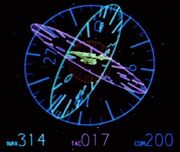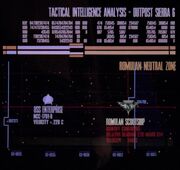Pseudohuman (talk | contribs) mNo edit summary |
mNo edit summary |
||
| (40 intermediate revisions by 11 users not shown) | |||
| Line 1: | Line 1: | ||
[[File:Hnd.jpg|thumb|360-degree axes]] |
[[File:Hnd.jpg|thumb|360-degree axes]] |
||
| + | [[File:Tactical analysis sierra vi.jpg|thumb|[[Romulan scoutship]] at relative bearing 270/mark 014]] |
||
| − | A '''bearing''' |
+ | A '''bearing''', sometimes referred to as '''relative bearing''', was a common way to describe a specific direction in relation to a [[starship]]. ({{TOS|Balance of Terror}}; {{TNG|The Defector}} ''display graphic'') |
| + | |||
| + | It was also used to describe a direction in [[subspace]]. ({{VOY|Eye of the Needle}}) |
||
== Uses == |
== Uses == |
||
| + | {{pna-incomplete}} |
||
| − | Bearings were used when defining the direction at which another object in space was located in relation to the ship or when the ship made a course correction in its current [[heading]]. ({{TOS|Balance of Terror}}) Bearings have also been used by [[away team]]s on the surface of a planet to indicate a direction. ({{TOS|By Any Other Name}}) |
||
| + | Bearings were commonly used to define the direction at which another object or the origin of a transmission was located in [[space]], in relation to the current orientation of the ship. Bearings have also been used to indicate a direction on a [[planet]] by an [[away team]] on the surface or from the planet's [[atmosphere]]. Bearings were also used when the ship made a course correction in its current [[heading]]. ({{TOS|Balance of Terror|By Any Other Name}}; {{film|4}}) |
||
| + | The [[Picard Maneuver]] included a [[sensor]] bearing. ({{TNG|The Battle}}) |
||
| − | Bearings are given in a combination of two 360-degree angles: |
||
| + | |||
| ⚫ | |||
| + | In space, bearings were given in one or two 360-degree angles, sometimes with one or two decimal place accuracy, with various other information. For example: |
||
| − | * "''341-mark-20. Range 12 [[kilometer]]s.''" ({{DS9|The Search, Part I}}) |
||
| − | * |
+ | * Mark-73.5 ({{TOS|Elaan of Troyius}}) |
| − | * |
+ | * 0-mark-4 ({{VOY|Once Upon a Time}}) |
| − | * |
+ | * 001-mark-.03 ({{TNG|Sins of The Father}}) |
| + | * 004-mark-009 ({{DS9|Sacrifice of Angels}}) |
||
| + | * 05-mark-231 ({{TNG|The Emissary}}) |
||
| + | * 010-mark-271 ({{TNG|Identity Crisis}}) |
||
| + | * 010-mark-273 ({{TNG|Reunion}}) |
||
| + | * 012-mark-6 ({{VOY|Thirty Days}}) |
||
| + | * 013-mark-015 ({{TNG|Suddenly Human}}) |
||
| + | * 017-mark-346 ({{DS9|The Way of the Warrior}}) |
||
| + | * 019.73-mark-62.32 ({{PIC|Vox}}) |
||
| + | * 23-mark-217 ({{DS9|Emissary}}) |
||
| + | * 067-mark-24 ({{VOY|Ex Post Facto}}) |
||
| + | * 102-mark-4 ({{TNG|Face Of The Enemy}}) |
||
| ⚫ | |||
| + | * 123 degrees-mark-18 ({{TOS|The Changeling}}) |
||
| + | * 125-mark-21 ({{VOY|Prime Factors}}) |
||
| + | * 162 mark-7 ({{VOY|Message in a Bottle}}) |
||
| + | * 180-mark-0 ({{DS9|For the Uniform}}) |
||
| + | * 187-mark-025 ({{DS9|The Way of the Warrior}}) |
||
| + | * 219-mark-[[47]] ({{VOY|Resistance}}) |
||
| + | * 235-point-7 ({{TNG|Haven}}) |
||
| + | * 240 degrees-mark-6, [[port]] ({{film|6}}) |
||
| + | * 316-mark-4 ({{film|2}}) |
||
| + | * 320 degrees-mark-2 ({{film|11}}) |
||
| + | * 358-mark-269 ({{DIS|The Vulcan Hello}}) |
||
| + | |||
| + | On a planet, bearings were also given in one or two 360-degree angles, with various other information. For example: |
||
| + | * 300-mark-7 ({{TOS|By Any Other Name}}) |
||
| + | * 94-mark-7, angle of elevation 6 degrees. ({{TOS|Obsession}}) |
||
| + | * About 11 [[mile]]s, bearing 121 from the mining company. ({{TOS|Mudd's Women}}) |
||
| + | * 283 degrees. 15.2 kilometers. ({{film|4}}) |
||
| + | * 327 degrees. Distance 600 [[nautical mile|nautical]]. ({{film|4}}) |
||
== Appendices == |
== Appendices == |
||
| Line 22: | Line 56: | ||
=== Background information === |
=== Background information === |
||
| − | The first use of the term bearing to indicate a direction occurred in |
+ | The first use of the term bearing to indicate a direction occurred in {{s|TOS}} episode "Balance of Terror". The meaning of bearings has been further defined in the writer's guides and several [[reference books]], such as ''[[Star Trek: The Next Generation Technical Manual]]'' (p. 36). Bearing 000-mark-0 is directly in front of the ship and bearing 180-mark-0 directly behind the ship. Coming about to bearing 090-mark-0 would be a sharp turn to the right or [[starboard]]. Coming about to bearing 270-mark-0 would be a sharp turn to the left or port. The second figure after the "mark" is the elevation angle. Coming about to bearing 000-mark-90 would be tilting the ship directly upwards and 000-mark-270 directly downwards. |
| + | === Deleted references === |
||
| − | Bearing 000-mark-0 is directly in front of the ship and bearing 180-mark-0 directly behind the ship. Coming about to bearing 090-mark-0 would be a sharp turn to the right or [[starboard]]. Coming about to bearing 270-mark-0 would be a sharp turn to the left or port. The second figure after the "mark" is the elevation angle. Coming about to bearing 000-mark-90 would be tilting the ship directly upwards and 000-mark-270 directly downwards. |
||
| + | According to the {{st-minutiae|resources/scripts/twok.txt|script}} for {{film|2}}, a second patrol formation of [[Klingon]] [[cruiser]]s approached the {{USS|Enterprise|NCC-1701}} on a bearing of "''090-mark-20''" to the {{USS|Enterprise|NCC-1701}} in the ''[[Kobayashi Maru]]'' [[Kobayashi Maru scenario|scenario]]. |
||
| + | |||
| + | According to the {{st-minutiae|resources/scripts/tvh.txt|script}} for {{film|4}}, as the {{HMS|Bounty}} was leaving [[Earth]], [[Nyota Uhura|Uhura]] detected an unidentified [[aircraft]] in Earth's [[atmosphere]] at "''range 30 miles, bearing 010''". |
||
=== External link === |
=== External link === |
||
* {{wikipedia|Bearing (navigation)}} |
* {{wikipedia|Bearing (navigation)}} |
||
| − | |||
[[Category:Cartography]] |
[[Category:Cartography]] |
||
Latest revision as of 19:05, 14 April 2023

360-degree axes

Romulan scoutship at relative bearing 270/mark 014
A bearing, sometimes referred to as relative bearing, was a common way to describe a specific direction in relation to a starship. (TOS: "Balance of Terror"; TNG: "The Defector" display graphic)
It was also used to describe a direction in subspace. (VOY: "Eye of the Needle")
Uses
Bearings were commonly used to define the direction at which another object or the origin of a transmission was located in space, in relation to the current orientation of the ship. Bearings have also been used to indicate a direction on a planet by an away team on the surface or from the planet's atmosphere. Bearings were also used when the ship made a course correction in its current heading. (TOS: "Balance of Terror", "By Any Other Name"; Star Trek IV: The Voyage Home)
The Picard Maneuver included a sensor bearing. (TNG: "The Battle")
In space, bearings were given in one or two 360-degree angles, sometimes with one or two decimal place accuracy, with various other information. For example:
- Mark-73.5 (TOS: "Elaan of Troyius")
- 0-mark-4 (VOY: "Once Upon a Time")
- 001-mark-.03 (TNG: "Sins of The Father")
- 004-mark-009 (DS9: "Sacrifice of Angels")
- 05-mark-231 (TNG: "The Emissary")
- 010-mark-271 (TNG: "Identity Crisis")
- 010-mark-273 (TNG: "Reunion")
- 012-mark-6 (VOY: "Thirty Days")
- 013-mark-015 (TNG: "Suddenly Human")
- 017-mark-346 (DS9: "The Way of the Warrior")
- 019.73-mark-62.32 (PIC: "Vox")
- 23-mark-217 (DS9: "Emissary")
- 067-mark-24 (VOY: "Ex Post Facto")
- 102-mark-4 (TNG: "Face Of The Enemy")
- 111-mark-14 (TOS: "Balance of Terror")
- 123 degrees-mark-18 (TOS: "The Changeling")
- 125-mark-21 (VOY: "Prime Factors")
- 162 mark-7 (VOY: "Message in a Bottle")
- 180-mark-0 (DS9: "For the Uniform")
- 187-mark-025 (DS9: "The Way of the Warrior")
- 219-mark-47 (VOY: "Resistance")
- 235-point-7 (TNG: "Haven")
- 240 degrees-mark-6, port (Star Trek VI: The Undiscovered Country)
- 316-mark-4 (Star Trek II: The Wrath of Khan)
- 320 degrees-mark-2 (Star Trek)
- 358-mark-269 (DIS: "The Vulcan Hello")
On a planet, bearings were also given in one or two 360-degree angles, with various other information. For example:
- 300-mark-7 (TOS: "By Any Other Name")
- 94-mark-7, angle of elevation 6 degrees. (TOS: "Obsession")
- About 11 miles, bearing 121 from the mining company. (TOS: "Mudd's Women")
- 283 degrees. 15.2 kilometers. (Star Trek IV: The Voyage Home)
- 327 degrees. Distance 600 nautical. (Star Trek IV: The Voyage Home)
Appendices
See also
Background information
The first use of the term bearing to indicate a direction occurred in Star Trek: The Original Series episode "Balance of Terror". The meaning of bearings has been further defined in the writer's guides and several reference books, such as Star Trek: The Next Generation Technical Manual (p. 36). Bearing 000-mark-0 is directly in front of the ship and bearing 180-mark-0 directly behind the ship. Coming about to bearing 090-mark-0 would be a sharp turn to the right or starboard. Coming about to bearing 270-mark-0 would be a sharp turn to the left or port. The second figure after the "mark" is the elevation angle. Coming about to bearing 000-mark-90 would be tilting the ship directly upwards and 000-mark-270 directly downwards.
Deleted references
According to the script for Star Trek II: The Wrath of Khan, a second patrol formation of Klingon cruisers approached the USS Enterprise on a bearing of "090-mark-20" to the USS Enterprise in the Kobayashi Maru scenario.
According to the script for Star Trek IV: The Voyage Home, as the HMS Bounty was leaving Earth, Uhura detected an unidentified aircraft in Earth's atmosphere at "range 30 miles, bearing 010".
